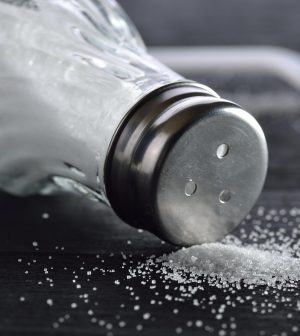- Could Your Grocery Store Meat Be Causing Recurring UTIs?
- Are You Making This Expensive Thermostat Error This Winter?
- Recognizing the Signs of Hypothyroidism
- 10 Strategies to Overcome Insomnia
- Could Artificial Sweeteners Be Aging the Brain Faster?
- Techniques for Soothing Your Nervous System
- Does the Water in Your House Smell Funny? Here’s Why
- Can a Daily Dose of Apple Cider Vinegar Actually Aid Weight Loss?
- 6 Health Beverages That Can Actually Spike Your Blood Sugar
- Treatment Options for Social Anxiety Disorder
Salt Substitutes Help Prevent High Blood Pressure

Replacing regular salt with a salt substitute can reduce high blood pressure in older adults, a new study has found.
Older adults who use a salt substitute are 40% less likely to develop high blood pressure compared to those who use regular salt, according to findings published Feb. 12 in the Journal of the American College of Cardiology.
“Adults frequently fall into the trap of consuming excess salt through easily accessible and budget-friendly processed foods,” said lead researcher Dr. Yangfeng Wu, executive director of the Peking University Clinical Research Institute in Beijing.
“It’s crucial to recognize the impact of our dietary choices on heart health and increase the public’s awareness of lower-sodium options,” he added in a journal news release.
High blood pressure is the leading risk factor for heart disease and heart-related death, according to the World Health Organization. It affects more than 1.4 billion adults worldwide and results in 10.8 million deaths each year.
For this study, researchers evaluated how sodium reduction might help the blood pressure of seniors residing in care facilities in China.
The study involved more than 600 participants, age 55 and older, from 48 care facilities. All patients had blood pressure under 104/90 mmHG, and were not on any blood pressure medications.
Half of the care facilities replaced salt with a salt substitute in residents’ meals, while the other half kept using regular salt, researchers said.
After two years, the incidence of high blood pressure was more than double at the facilities that kept using salt – 24.3 cases per 100 people-years versus 11.7 cases per 100 people-years at the facilities using salt substitute.
People-years take into account both the number of people in a study and the amount of time each person spends in the study.
What’s more, the salt substitutes did not cause dangerously low blood pressure, which also commonly affects older adults.
“Our results showcase an exciting breakthrough in maintaining blood pressure that offers a way for people to safeguard their health and minimize the potential for cardiovascular risks, all while being able to enjoy the perks of adding delicious flavor to their favorite meals,” Wu said.
In an accompanying editorial, nephrologist Dr. Rik Olde Engberink said the study offers an alternative to simply asking patients to cut back on salt intake – a strategy that has failed to gain wide support among the public.
In this trial, “the salt substitute was given to the kitchen staff, and the facilities were not allowed to provide externally sourced food more than once per week,” Olde Engberink, who practices at Amsterdam University Medical Center in The Netherlands, said in a news release.
“This approach potentially has a greater impact on blood pressure outcomes, and for this reason, salt substitutes should be adopted early in the food chain by the food industry so that the sodium-potassium ratio of processed foods will improve,” he added.
More information
The Mayo Clinic has more about reducing dietary sodium.
SOURCE: American College of Cardiology, news release, Feb. 13, 2024
What This Means For You
People who want to keep their blood pressure low should take steps to lower the amount of sodium they eat.
Source: HealthDay
Copyright © 2026 HealthDay. All rights reserved.










